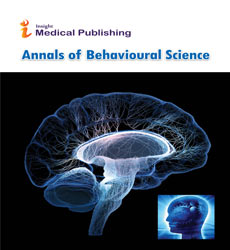Behavioral Conditions
Chan Bagh
Chan Bagh*
Department of Psychology, University of Florida, Florida, United States
- *Corresponding Author:
- Chan Bagh
Department of Psychology
University of Florida
Florida, United States
E-mail: Chanbagh@fl.edu
Received Date: September 3, 2021; Accepted Date: September 17, 2021; Published Date: September 24, 2021
Citation: Bagh C (2021) Behavioral Conditions. Ann Behav Sci Vol.6 No.1:e013.
Editorial
Behavioral conditions are a classification of mental problems described by suffering maladaptive examples of conduct, comprehension, and internal experience, displayed across numerous unique situations and going astray from those acknowledged by the singular's way of life. These examples grow early, are rigid, and are identified with critical trouble or handicap. The definitions might shift to some degree, steady with source, and stay an issue of debate. Official standards for diagnosing behavioral conditions are recorded inside the fifth section of the International Classification of Diseases (ICD) and inside the American Psychiatric Association's Diagnostic and Statistical Manual of Mental Disorders (DSM).
Character, characterized mentally, is that the arrangement of enduring social and mental qualities that recognize individual people. Consequently, behavioral conditions are characterized by encounters and practices that stray from accepted practices and assumptions. Those determined to have a psychological problem might encounter troubles in comprehension, emotiveness, relational working, or motivation control. As a rule, behavioral conditions are analyzed in 40–60% of mental patients, making them the principal regular of mental determinations.
Behavioral conditions are described by a never-ending assortment of standards of conduct frequently identified with significant individual, social, and word related interruption. Behavioral conditions likewise are resolute and unavoidable across numerous circumstances, generally on account of the very reality that such conduct could likewise be sense of self syntonic (for example the examples are as per the inner self respectability of the individual) and are thusly appeared to be suitable by that person. Also, individuals with behavioral conditions frequently need understanding into their condition then, at that point cease from looking for treatment. This conduct might bring about maladaptive adapting abilities and should mess individual up that prompt outrageous tension, pain, or discouragement and end in disabled psychosocial working. These standards of conduct are normally perceived by preadulthood, the beginning of adulthood or here and there even youth and in some cases adversely affect the norm of life.
While arising medicines, as rationalistic conduct alteration, have shown viability in treating behavioral conditions, similar to verge mental turmoil, behavioral conditions are identified with significant shame in famous and clinical talk alike. Despite different methodological outlines intended to arrange behavioural conditions, many issues happen with grouping a behavioral condition in light of the fact that the hypothesis and analysis of such problems happen inside winning social assumptions; accordingly, their legitimacy is challenged by certain specialists based on unavoidable subjectivity. They contend that the thought and finding of behavioral conditions depend rigorously on friendly, or perhaps sociopolitical and financial contemplations.
The ICD framework might be an assortment of mathematical codes that are doled out to all or any realized clinical illness states, which gives uniform wording to clinical records, charging, and research purposes. The DSM characterizes mental conclusions upheld exploration and master agreement, and its substance advises the ICD-10 characterizations. Both have purposely blended their findings somewhat, however a few contrasts remain. For instance, ICD-10 does exclude behavioral condition as an unmistakable classification, while DSM-5 does exclude suffering character change after cataclysmic experience or after mental sickness. ICD-10 orders the DSM-5 schizotypal behavioral condition as a type of schizophrenia instead of as a behavioral condition. There are acknowledged demonstrative issues and debates concerning recognizing specific behavioral condition classes from each other pain.
Open Access Journals
- Aquaculture & Veterinary Science
- Chemistry & Chemical Sciences
- Clinical Sciences
- Engineering
- General Science
- Genetics & Molecular Biology
- Health Care & Nursing
- Immunology & Microbiology
- Materials Science
- Mathematics & Physics
- Medical Sciences
- Neurology & Psychiatry
- Oncology & Cancer Science
- Pharmaceutical Sciences
